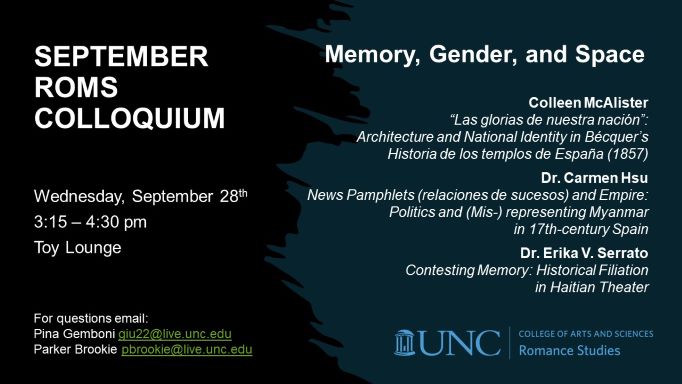
- This event has passed.
ROMS Colloquium
September 28, 2022 @ 3:30 pm - 4:30 pm

Please join us on Wednesday, September 28th at 3:15 pm in Toy Lounge for the September ROMS colloquium featuring presentations on Memory, Gender and Space by Colleen McAlister, Ph.D. Candidate in Spanish, Dr. Carmen Hsu, Associate Professor of Spanish, and Dr. Erika V. Serrato, Assistant Professor of French and Francophone Studies.
The goal of the Colloquium is to create an informal and productive space for faculty and PhD candidates to share their work in order to receive feedback and to foster new connections within Romance Studies.
Below you will find the title and description of the presenters’ work:
• Colleen McAlister: “Las glorias de nuestra nación”: Architecture and National Identity in Bécquer’s Historia de los templos de España (1857)
In the mid-nineteenth century, the perception of Spain as an “exotic” locale proliferated abroad. This idea was based, in part, on the nation’s Islamic cultural heritage, unique within Europe, and fortified by contemporary literary works like Washington Irving’s Tales of the Alhambra (1832). At roughly the same time, Spain was also seen as an essentially Catholic nation, characterized as “barbarous” by some for its centuries-long Inquisition and by others as a unique epicenter of Christian ideals that had survived the Middle Ages. How did these foreign perceptions affect Spain’s view of itself? This presentation explores that process in Historia de los templos de España (1857) by Gustavo Adolfo Bécquer. It will analyze Bécquer’s study of the mosque-turned-church El Cristo de la Luz in Toledo as one example of how the nation negotiated its Islamic and Christian heritage as part of the formation of Spanish identity in an age of nation-building.
• Dr. Carmen Hsu: News Pamphlets (relaciones de sucesos) and Empire: Politics and (Mis-) representing Myanmar in 17th-century Spain
This talk is result of my investigation into the strange events surrounding Filipe de Brito e Nicote, one private Portuguese freebooter, in Lower Myanmar at the beginning of the seventeenth century. Brito carved out a short-lived kingdom for himself at Syriam from 1600 until he was impaled on an iron stake by king Anaukpetlun of Ava in 1613. Knowing that Portugal remained under the control of the Castilian crown, I was intrigued by the relations between him, Portugal’s Estado da Índia, and king Philip III of Spain. After further examination, I found that Brito, acting on his own initiative, not only played a significant role in Myanmar, but also convinced Philip III that he would turn him into “the lord of all those kingdoms,” by the conquest of Pegu and the acquisition of its treasure. Despite the disastrous outcome, two relaciones de sucesos were published to celebrate the Hispanic Empire’s victory. I was thus confused: why and how did these two relaciones de sucesos manipulate news about Brito’s failed enterprise? What does this “fake news” inform us of Spain’s foreign policy? Further, to what extent was the work of an individual entrepreneur like Brito able to guide official policy in Southeast Asia? Consulting the relaciones de sucesos, contemporary Iberian travel accounts, and the correspondence between the viceroy of Portugal in India and king Philip III of Spain during 1600-1614, my presentation seeks to answer to these questions.
• Dr Erika V. Serrato: Contesting Memory: Historical Filiation in Haitian Theater
My talk explores theatrical representations of Haiti’s indigenous past. Plays such as Henri Chauvet’s La fille du Kacik(1894) and Jean Métellus’ Anacaona (1986) challenge documented accounts and the gendered constraints of society. Chronicled figures like Anacaona have come to serve as “founding mothers” of Haitian struggles against conquest and colonialism. I consider how historical figures such as her – as well as the more telling character constructions – present and evade monolithic notions of indigeneity, the nation, and motherhood. In particular, I examine the ways in which the characters’ roles as leaders, mothers, and daughters maroon historical roles and establish themselves as foundational myths.
